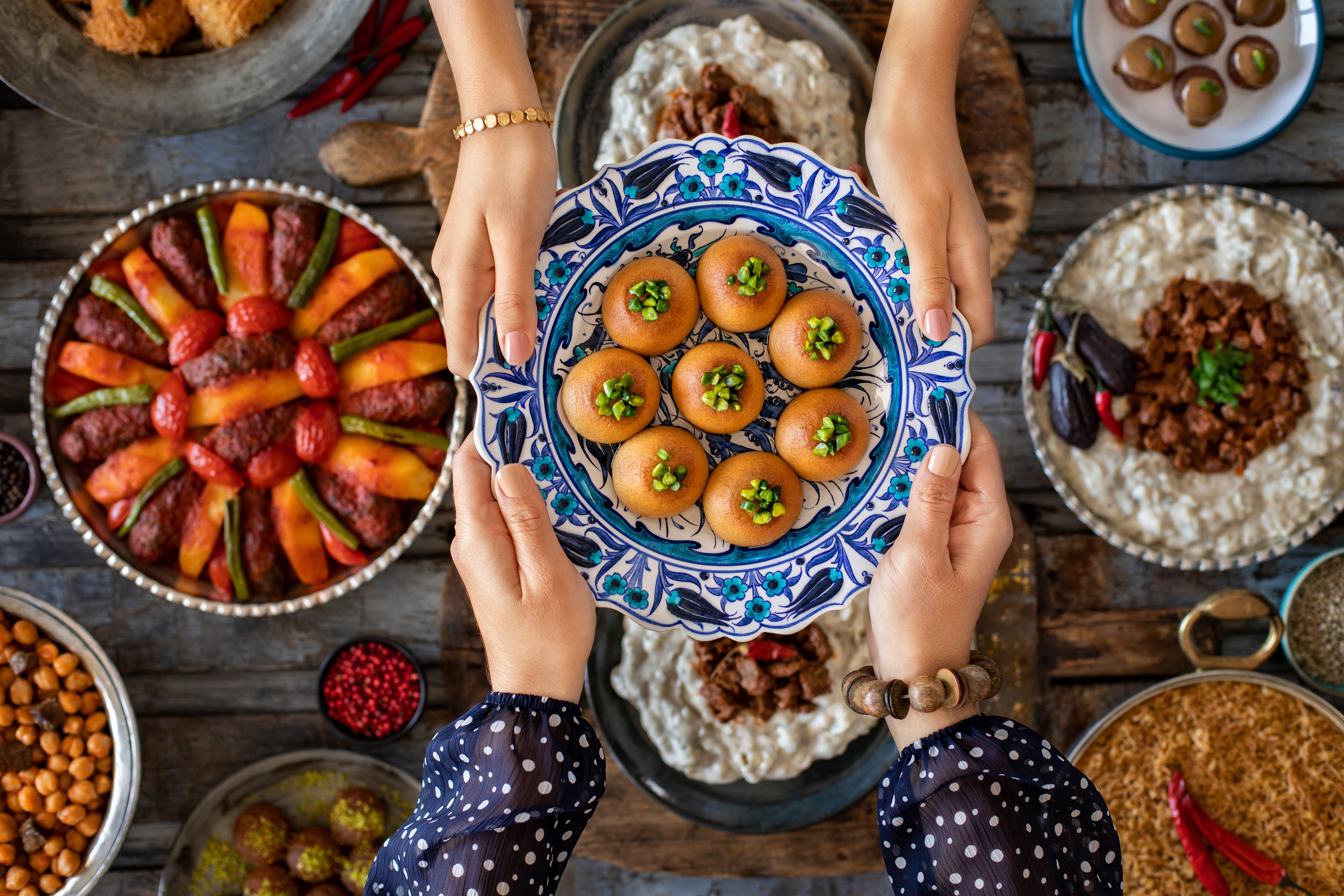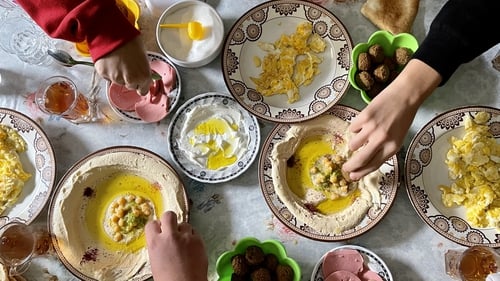Places To Savor The Flavor Of Palestinian Food
Palestinian cuisine is not just about sustenance; it's a celebration of history and community. Food holds a special place in Palestinian culture, symbolizing hospitality, generosity, and love. Each dish tells a story, passed down through generations, embodying the resilience and spirit of the Palestinian people.

Key Ingredients in Palestinian Cuisine
At the heart of Palestinian cooking are staple ingredients like olive oil, za'atar, sumac, and tahini. Olive oil, known as "liquid gold," is used abundantly, imparting a rich, fruity flavor to dishes. Za'atar, a fragrant herb blend, adds depth to salads and meats, while sumac lends a tangy brightness. Tahini, made from sesame seeds, is a versatile condiment used in dips and dressings.
Traditional Palestinian Dishes
No journey through Palestinian cuisine is complete without sampling iconic dishes like Musakhan, Mansaf, Maqluba, and Falafel. Musakhan, a festive chicken and sumac dish, is often served on special occasions, symbolizing unity and abundance. Mansaf, the national dish of Jordan, is a lavish feast of lamb cooked in fermented yogurt sauce, served with rice and flatbread.
Regional Variations
The diversity of Palestinian cuisine is evident in regional variations found in Gaza, the West Bank, and Jerusalem. Gaza cuisine is known for its seafood specialties, while the West Bank boasts hearty, rustic fare. Jerusalem cuisine, influenced by various cultures, offers a fusion of flavors, from aromatic spices to sweet desserts.
Famous Palestinian Desserts
Indulge your sweet tooth with decadent Palestinian desserts like Knafeh, Baklava, and Basbousa. Knafeh, a beloved pastry made with shredded phyllo dough and cheese, is soaked in sugar syrup and topped with pistachios. Baklava, layers of filo pastry filled with nuts and sweetened with honey, is a delectable treat enjoyed across the Middle East.
Unique Dining Experiences
Immerse yourself in Palestinian hospitality with unique dining experiences, from bustling street food markets to intimate family-owned restaurants. Sample freshly grilled kebabs, aromatic stews, and crispy falafel while soaking in the vibrant atmosphere of local markets. For a hands-on experience, join a cooking class and learn to prepare traditional Palestinian dishes from expert chefs.
Popular Palestinian Beverages
Quench your thirst with refreshing Palestinian beverages like Arabic coffee, herbal teas, and fresh fruit juices. Arabic coffee, strong and aromatic, is served in small cups with a side of sweet treats, symbolizing hospitality and friendship. Herbal teas infused with mint, sage, and chamomile are enjoyed for their soothing properties, while fresh fruit juices offer a burst of natural flavor.

Etiquette and Customs
When dining in Palestine, embrace the warm hospitality and observe traditional customs. Guests are welcomed with open arms and treated with respect and generosity. It's customary to eat with your right hand, using bread as a utensil, and to express gratitude for the meal by complimenting the host's cooking.
Health Benefits of Palestinian Cuisine
Beyond its delicious flavors, Palestinian cuisine offers numerous health benefits. Rich in fruits, vegetables, whole grains, and lean proteins, it reflects the principles of the Mediterranean diet, known for its heart-healthy properties. Olive oil, a cornerstone of Palestinian cooking, is high in monounsaturated fats and antioxidants, promoting overall well-being.
Challenges and Opportunities
While Palestinian cuisine has gained popularity worldwide, it faces challenges in terms of accessibility and cultural appropriation. Many traditional ingredients and dishes are not widely available outside of Palestine, limiting opportunities for global appreciation. Additionally, there are concerns about the misrepresentation and commercialization of Palestinian food, highlighting the importance of preserving its authenticity.
Supporting Palestinian Food Culture
One way to support Palestinian food culture is by advocating for Palestinian-owned businesses and promoting cultural exchange programs. By patronizing restaurants, markets, and culinary events that celebrate Palestinian cuisine, individuals can contribute to the preservation and promotion of this rich culinary heritage. Through meaningful engagement and dialogue, we can foster greater understanding and appreciation of Palestinian food culture.

Recipes to Try at Home
Bring the flavors of Palestine into your kitchen with simple yet delicious recipes like Hummus, Tabouleh, and Shawarma. Whip up creamy hummus using chickpeas, tahini, garlic, and lemon juice, and serve with warm pita bread for a satisfying snack or appetizer. Tabouleh, a vibrant salad made with parsley, tomatoes, onions, and bulgur wheat, is bursting with freshness and flavor. And for a taste of street food magic, try your hand at making Shawarma, tender slices of marinated meat wrapped in soft flatbread and topped with tangy tahini sauce.
Sustainability Practices
As awareness of environmental issues grows, there is a renewed focus on sustainability practices within Palestinian food culture. From farm-to-table initiatives to the preservation of traditional farming methods, efforts are underway to promote eco-friendly practices and reduce food waste. By supporting local farmers and producers, we can contribute to the preservation of Palestinian agriculture and culinary heritage for future generations to enjoy.
Future of Palestinian Food
As Palestinian cuisine continues to gain recognition on the global stage, there is excitement about its future possibilities. From innovative culinary creations to cross-cultural collaborations, the evolving landscape of Palestinian food offers endless opportunities for exploration and creativity. By embracing tradition while embracing innovation, Palestinian chefs and food enthusiasts are shaping the future of food in Palestine and beyond.
1. What makes Palestinian cuisine unique?
Palestinian cuisine is unique due to its rich history, diverse flavors, and cultural significance. Influenced by various civilizations and culinary traditions, it offers a tantalizing blend of spices, herbs, and fresh ingredients.
2. Where can I find authentic Palestinian food outside of Palestine?
While Palestinian restaurants can be found in major cities around the world, authentic Palestinian food is often best experienced in Palestinian-owned establishments or through home-cooked meals prepared by Palestinian families.
3. Is Palestinian cuisine vegetarian-friendly?
Yes, Palestinian cuisine offers a wide variety of vegetarian dishes, including hearty salads, stuffed vegetables, and flavorful dips like hummus and baba ghanoush. Many traditional Palestinian meals are naturally plant-based and can be enjoyed by vegetarians and vegans alike.
4. What are some must-try Palestinian desserts?
Some must-try Palestinian desserts include Knafeh, a sweet cheese pastry soaked in sugar syrup; Baklava, layers of filo pastry filled with nuts and sweetened with honey; and Basbousa, a semolina cake soaked in rosewater syrup.
5. How can I support Palestinian food culture from afar?
You can support Palestinian food culture by seeking out Palestinian-owned businesses, attending cultural events and festivals, and advocating for the preservation of Palestinian culinary traditions. Additionally, sharing recipes and stories about Palestinian cuisine helps to raise awareness and promote appreciation.
Direct BookingIn conclusion, Palestinian cuisine is a treasure trove of flavors, stories, and traditions waiting to be explored. Whether you're savoring the aroma of freshly baked bread in a bustling market or enjoying a leisurely meal with loved ones, each bite is an invitation to experience the warmth and hospitality of Palestinian culture. So, let your taste buds be your guide as you embark on a culinary journey through the rich tapestry of Palestinian food.








